
BLOG
How to balance “I must publish” and “I need to find a story that matters“
 Sovereign Standard, Issue 40
Sovereign Standard, Issue 40
The greatest epiphanies are just clichés - until they’re true
“You’ve had it in you all along” is one of those mundane epiphanies tossed about by countless gurus and charlatans, true healers and glitzy motivational speakers. And yet, the day you truly come to know this as your truth, it’s like the sunset, moonrise, and northern lights all fill the sky at once.
For years, I’ve been living out loud on the internet. Perhaps you’ve been like me - trying (and generally failing) to be an easy, breezy online writer. I refused to dumb down my message, but I also avoided a avoiding the hardest questions and denied the most personal answers.
Basically, I was so intent on saying something that I would rarely let myself slow down, look within, learn more, and ensure I was saying something that really mattered to me.
You’ve heard the old marketing adage “you aim to appeal to everyone and you appeal to no one”?
When you don’t feel free to tell the stories that are really important to you as a writer, you’re never going to tell stories that are important to the reader.
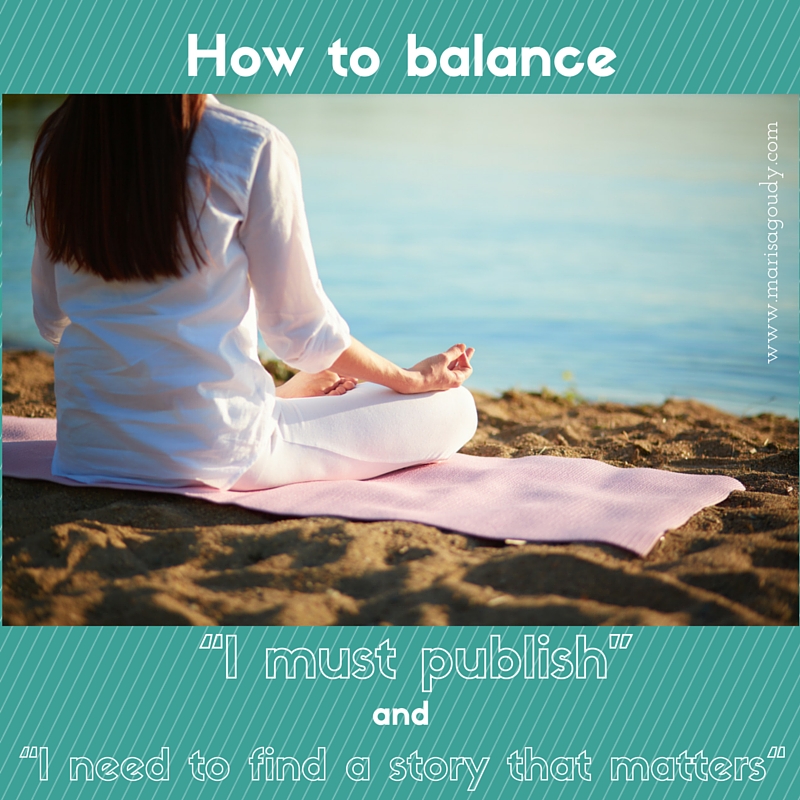 What it means to put the inner story first
What it means to put the inner story first
At last , I’m committing to prioritizing my interior process over the public conversation.
That means I'm committing to diving deeper, thinking longer, allowing ideas to germinate before I push myself to publish.
This isn’t a prescription for permanent radio silence. Heck, I'm blogging about my decision to putting the inner work before the public exploration of what I’ve learned!
The goal is not to become an all-analog hermit. Instead, it means I’m placing my creative emphasis on knowing a story at its intimate core before I bring it to an audience.
It means I ask myself questions that matter to me before I try to tell you why any of it might matter to you.
I’m exhausted by the pace of a digital world that puts action over contemplation. It feels good to play with phrases like:
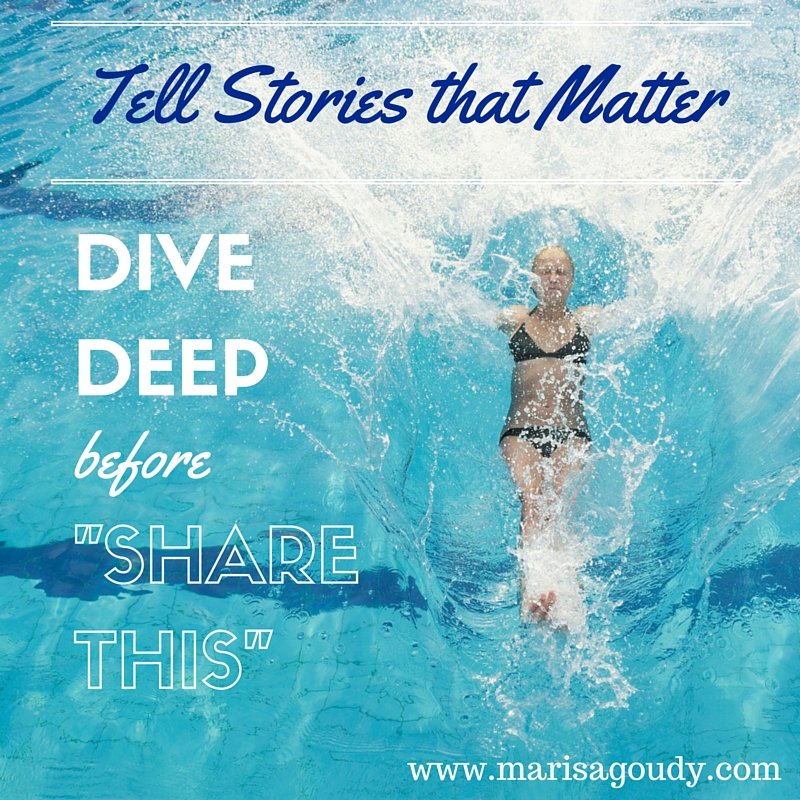 Perspective before performance.
Perspective before performance.
Introspection before exhibition.
Dive deep before ”share this!”
Finding the balance between finding the inner story and publishing it
As a writer who depends on building online community to build my business, deep dives into “what stories must I tell?” will cool my self-imposed “gotta publish at all costs!” madness.
But I know that the “explore the inner story” and “publish something now” is balancing act that puts other people on the opposite side of the teeter totter. (Thanks to my brave compatriots in the Quest 2016 community - see below.)
You might be a writer who loves to let a good idea simmer. It would be wonderful if my frantic "must create content!" experience makes you feel more secure in your slower-to-publish approach.
Many frantic writers wish they had your sense of trust and composure. Hopefully, you see that your ability to contemplate and craft your thoughts is a rare gift in this “get it out there” environment.
But, maybe you’re more of the “perfection = paralysis” kind of writer. You tend to over-think your work and start cleaning the bathtub with a toothbrush to avoid committing to a regular blogging schedule. I’d love my push to publish energy to rub off on you a bit.
It's good enough. Get it out there.
I know my 2015 commitment to the very-nearly-weekly Sovereign Standard is going to have a perpetual payoff, both personally and professionally. Even if I put the "real" story on the back burner while I tried to put out simpler messages intended to please the crowd.
Find the balance between the inner exploration and the greater conversation
Ultimately, if you're someone who wants to build a business through "content marketing" (telling stories and sharing your wisdom to entice new clients and delight your current community) or if you're a creative who must put ideas on the page, it's about striking a balance.
You need the inner exploration and you'll thrive when part a greater conversation.
If you'll excuse me, I need to get back to the stories still welling up inside me. But I promise I'll come back with ideas that will help you tell yours. Subscribe to my weekly Sovereign Standard newsletter - please?
*****
This post was initially inspired by Prompt #1 in Tracking Wonder's Quest 2016. The mastermind of this project, Jeffrey Davis, has called together 12 visionaries to help you create your best 12 months. It was a powerful way to begin my 2015 and I'm eager for this year's experience.
In particular, I was responding to Susan Piver who asked us to consider "What I most need to tell myself about 2016 is…"
Find more about Susan, the Quest, the business artist pledge, and how to join (it's totally free).
Can you be vulnerable and write “I don’t know” on your business blog?
Sovereign Standard, Issue 34 The writer looks like she is sitting at a keyboard or scribbling furiously in a journal. She seems to be occupying the same space and time as everyone else in the room, but, in reality, she’s exploring territory that she can explain, but never let you view directly.
The writer looks like she is sitting at a keyboard or scribbling furiously in a journal. She seems to be occupying the same space and time as everyone else in the room, but, in reality, she’s exploring territory that she can explain, but never let you view directly.
Whether it’s fiction or theory or even marketing copy that comes from the heart, she’s deep in her own inner landscape. This marvelous space is only limited by the scope of her own imagination and knowledge.
This private world is not infinite. Instead, it’s an eternally elastic territory. The borders are pushed outward by everything she learns and by every experience that invites her to grow.
And yet, there are limits. The writer will reach her edge. Then what?
The Blogger’s Dilemma: The Question Without an Easy Answer
When I worked on the first draft of this week’s blog post, I found myself writing into a question without an answer.
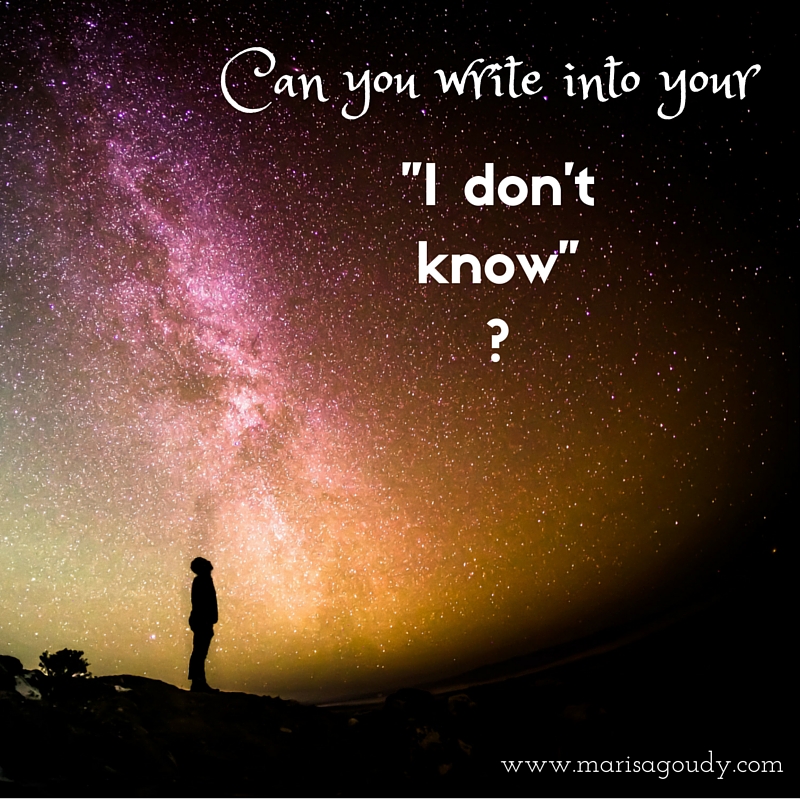 It was something so close to my “expertise” that I was shocked when I hit a big “I don’t know…”
It was something so close to my “expertise” that I was shocked when I hit a big “I don’t know…”
Often the best questions don’t have ready answers - that vast unknown is the seed of a book, a career, or a life's passion. By the same token, the best blog posts don't necessarily follow the "proven" formulas.
But, in my case, it felt like I should have an answer (and I don’t even let myself use the word should). After all, I was writing about storytelling and this was “just” a blog post… Finding myself at the edge of my frontier of knowledge was as unexpected as it was unsettling.
Sitting quietly in front of a Word doc, I felt uncertain and exposed.
I felt horribly vulnerable - even though no one ever needed to know that there was something really important about storytelling I couldn’t write about with ease.
And then, the magic of the writing practice kicked in: describing the view from my own intellectual edge became more important than the expertise I thought my readers would need.
This is the Vulnerability Business, right?
Last week’s post was about being in the vulnerability business. If you seek to transform lives and make this world more beautiful, bearable, or bold, you have a stall in the marketplace of vulnerability.
You hold space for your clients’ shame and uncertainties. And you strive to recognize vulnerability when you see it - starting with your own.
The writing process gives you a perfect window into your own vulnerabilities. After all, it’s about showing people how you organized ideas and crafted them to be understood by others. It's about being seen.
Something that wasn’t in the last post - writing can also expose what you might perceive as your “weaknesses.”
Remember, before Brené Brown taught us that “Vulnerability is the birthplace of love, belonging, joy, courage, empathy, and creativity,” most of us just equated vulnerability with weakness.
The gift of “I don’t know”
That unexpected “I don’t know” dropped me into the “fraud, fraud, fraud” pit. I’m sure I needn’t tell you that no decent writing has ever been produced in that despairing hell hole.
Let’s take a moment here to celebrate one of the many gifts of the writing practice: you can write your way through despair all the way to retrospect - sometimes in the same writing session!
Now, I can see “I don’t know” as a tremendous gift.
It’s an invitation to see things in a new way. It’s an opportunity to forgive myself for being a mere mortal who is still learning every day. It’s a chance to hit pause and do some really delicious research - and perhaps even read those books on writing that I love to buy but never have time to read (because it would eat into writing time, of course).
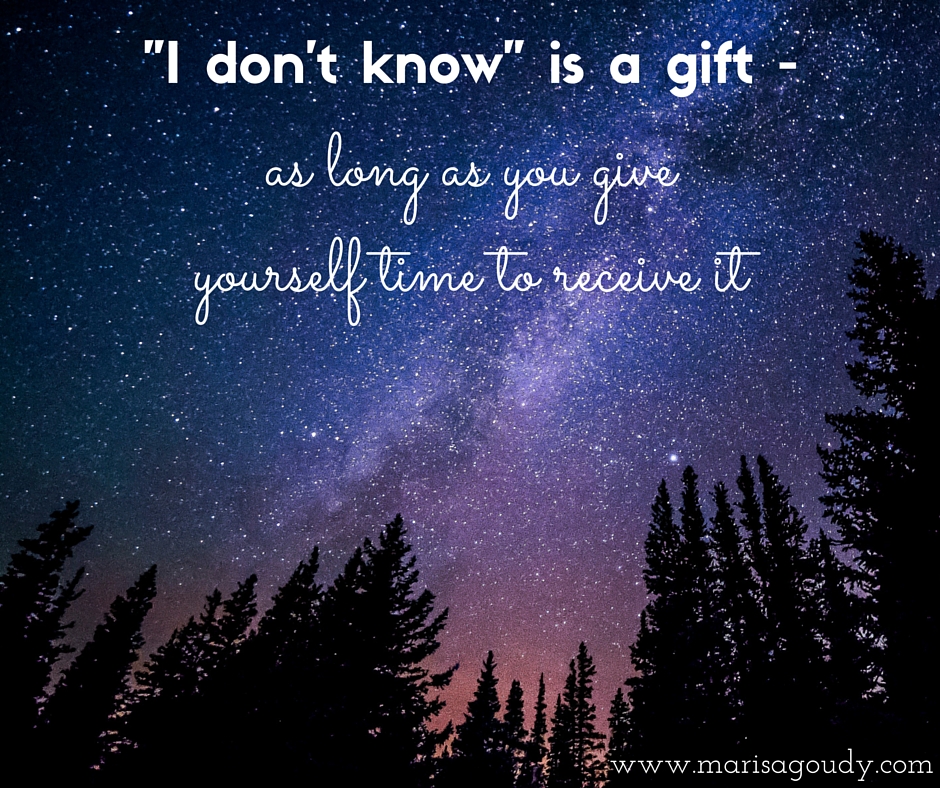 But what if you don’t have time receive the “I don’t know” gift?
But what if you don’t have time receive the “I don’t know” gift?
New perspective, self-acceptance, mindful pauses. Lots of people tell you how wonderful they are.
Truth is, it is hard to see all the opportunities in “I don’t know” when you simply don’t have the time to wander and wonder and expand the bounds of the known world.
There is only so much writing time per week. This time is not meant to be lavished on research or stumbling into terra incognita. It’s not meant to be spent on Facebook either, but that's another story.
So, what happens when you write yourself into an "I don't know" shaped corner but you just need to hit publish?
4 Ways a Writer Can Respond to an Unexpected “I Don’t Know”
Research. The universe just may be telling you that it IS ok to skip this week’s post and put your writing time into developing your own answer to that big, scary question.
(Admittedly, this week I told the universe I would get back to it about expanding my mind after I found a way to write something worth publishing, baked cupcakes for my 6 year-old’s birthday, and finished the outline for my new membership group. This may be an instance of “do as the writing coach says, not as she does.”)
Release. “Release” may be about skipping or delaying a post (see above). Losing sleep or publishing something that isn’t ready just because it’s supposed to be on the editorial calendar is never in your best interest.
(Personally, I find it almost impossible to break the publishing promise I've made to myself. I often choose to understand “realease” as letting go of the troublesome topic and allowing another idea to emerge.)
Repurpose. Look back at past posts, particularly material that appeared on old websites or on guest blog posts. Redo the intro and the conclusion and let yourself off the “must create original material” hook. Remember: this is always an option.
(Do you even remember what you wrote last year? Chances are there's real gold there. Looking back to your past posts isn't cheating - it's using all your resources wisely.)
Reach out. As I wrote this late into Wednesday night, I whined to my husband about being stuck in the blogging vortex. While I was happy that I had been able to release the original idea and repurpose the feelings that “I need to do more research” stirred up, I had well over 2000 words of wandering wonder. All I wanted was an intro, some useful content, and a compelling Invitation to Action! That was when the light went on - if only I had a writing coach!
All day long, I look at clients’ snarled up brilliance and help them pluck out the brightest, most evocative ideas and stories. It’s nearly always impossible to get perspective on your own work. If you can relate to this story, reach out to me and we’ll see how I can help you uncover your most brilliant thoughts.
*****
This week’s post was inspired by many factors including my big scary “I don’t know,” the conversation that last week’s vulnerability post has generated, and the Bravery Blogging Project I stumbled across this week (thanks, Molly!).
Illana Burk of Makeness Media is looking for her community to make “Real, original, difficult content.” I’m new to their world, but finding yet another circle of people who want to dive deep into an idea and risk writing outside the blogging “shoulds” stretches my mind in a wonderful new way. And it makes me feel like I can keep blogging about the “I don’t know” stuff and it encourages me to ask you to do the same.
The unexpected way your writing practice builds client loyalty and love
Sovereign Standard, Issue 33 “I feel really vulnerable right now,” she said. “I’ve never showed anyone but my husband a very first draft of my writing.”
“I feel really vulnerable right now,” she said. “I’ve never showed anyone but my husband a very first draft of my writing.”
We have a name to that feeling of being exposed thanks to the brilliant Brené. (Do I even need to mention her last name in this company?)
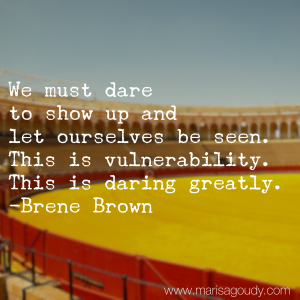 As a culture, we’re learning that vulnerability is vital to connection and growth. It’s an essential skill to master if you want to make the world more beautiful, bearable, and bold.
As a culture, we’re learning that vulnerability is vital to connection and growth. It’s an essential skill to master if you want to make the world more beautiful, bearable, and bold.
And yet, actually doing the stuff that puts your vulnerability skills to the test? Well, that’s another story.
Honoring your clients' vulnerability - and bravery
The client I quote above reminded me that sharing your writing - especially what Anne Lamott famously calls the “shitty first draft” - can be a terrifying experience.
Pressing “publish” and sending your words into the public arena isn’t the only thing that’s scary. Just sending it to someone who has earned your trust, like a writing coach, can give you the whim-whams.
Even if you want me to look more deeply at your writing. Even if you want me to question your logic and rework a paragraph that took you 45 minutes to write. Even when you trust me and trust our co-creative writing process, you still may shudder when I say "so, I read your piece..."
Almost everyone wrestles with the writing shame that was instilled in them by dismissive English teachers, unholy nuns, or grammarian grandmothers. I have to remind myself - often - that I’m pushing people into uncomfortable spaces by simply doing my job.
Are you in the vulnerability business too?
My dance with these beloved, vulnerable writers becomes even more complex since my clients themselves are in the vulnerability business.
And some of them never knew it was going to be part of the entrepreneurial ride.
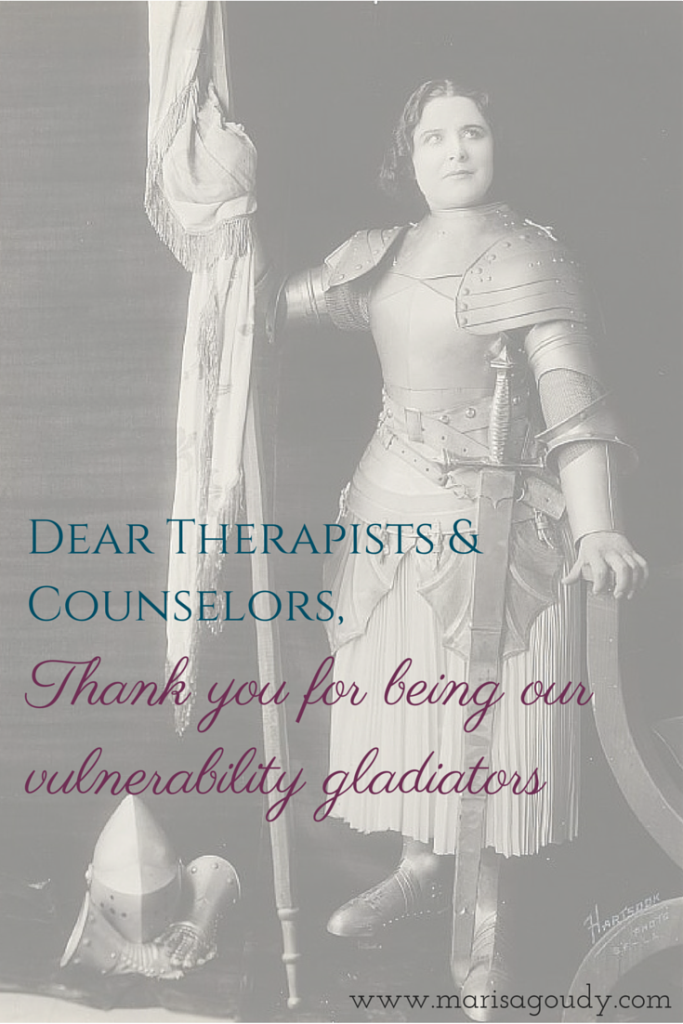 Therapists & Counselors, thank you for being our vulnerability gladiators
Therapists & Counselors, thank you for being our vulnerability gladiators
Therapists, of course, are schooled in the art and science of vulnerability. You specialize in emotional exposure - and how that tends to make people react or shut down.
Thank goodness we have you, dear counselors! I envision you there doing your brilliant work in the green room of the Daring Greatly "arena.”
Creative Entrepreneurs, you know you have a place in the arena too, right? Suit up!
And then there’s the rest of us creative entrepreneurs who learn from Brené Brown’s books. We look to the thought leaders (and bloggers!) who expose the crazy-sexy-scary underbelly of being alive and putting ourselves out there.
We creative entrepreneurs are not necessarily trained in the intricacies of the human psyche, but we still need to recognize we have a role to play in this arena.
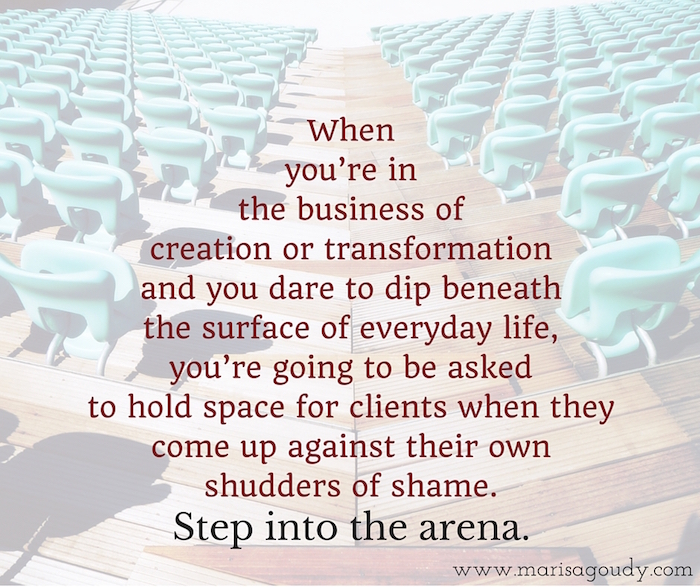 When you’re in the business of creation or transformation and you dare to dip beneath the surface of everyday life, you’re going to be asked to hold space for clients when they come up against their own shudders of shame.
When you’re in the business of creation or transformation and you dare to dip beneath the surface of everyday life, you’re going to be asked to hold space for clients when they come up against their own shudders of shame.
Support clients in their most vulnerable moments and help them make real, positive change… When you do that, you’re performing a service that’s so much more valuable than whatever you say you do on your website.
When you hold space in that way you’re creating a long term client and a forever fan.
How can you make vulnerability one of your greatest assets?
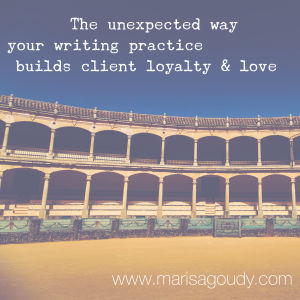 If being “that person” who can hold space for a client when she feels most exposed is how you earn the trust that builds a practice and a business, how can you get better at it?
If being “that person” who can hold space for a client when she feels most exposed is how you earn the trust that builds a practice and a business, how can you get better at it?
Start by recognizing what makes you feel vulnerable. Start with what feels risky. Start with your writing.
4 Key Lessons in Vulnerability You Can Learn From Your Own Writing Practice
- Recognize that you are stepping into the arena whenever you publish a blog post. Congratulate yourself for that.
- Realize that showing one focused reader something that you have written may feel a lot harder than sending it to a million faceless internet surfers.
- Acknowledge that your writer’s block is about more than time constraints and a hatred of grammar… it's likely rooted in that tricky mix of “please see me” and “eek! stop looking at me!”
- Notice when you’re asking your readers to be vulnerable. You’ll hone your vulnerability super powers when you become aware of the content that pushes readers out of their comfort zone.
Simply put, when you know your own vulnerabilities more intimately, you’ll be better able to detect them and honor them in others. People love it when you do that, you know. Think you might be ready to entrust me with your stories and your writing practice? Learn more about the writing coaching relationship.
I'll leave you with my favorite working definition of vulnerability by the brilliant Ahri Golden. Soak in these words. Put them into practice.
Vulnerability In the space between you and me Vulnerability is power Vulnerability in the space between you and me Vulnerability is the opposite of weak
Blogging beyond tricks: how to work the magic of intention and attention
Sovereign Standard, Issue 29  There are so many blogging gurus and “easy peasy” blogging plans out there. I’ve never claimed to be a blog expert and I will never tell you that writing is an easy process that you can hack through.
There are so many blogging gurus and “easy peasy” blogging plans out there. I’ve never claimed to be a blog expert and I will never tell you that writing is an easy process that you can hack through.
Instead, I call myself a writing coach and I promise to guide you and walk beside you through what can only be called a dedicated practice of writing for business.
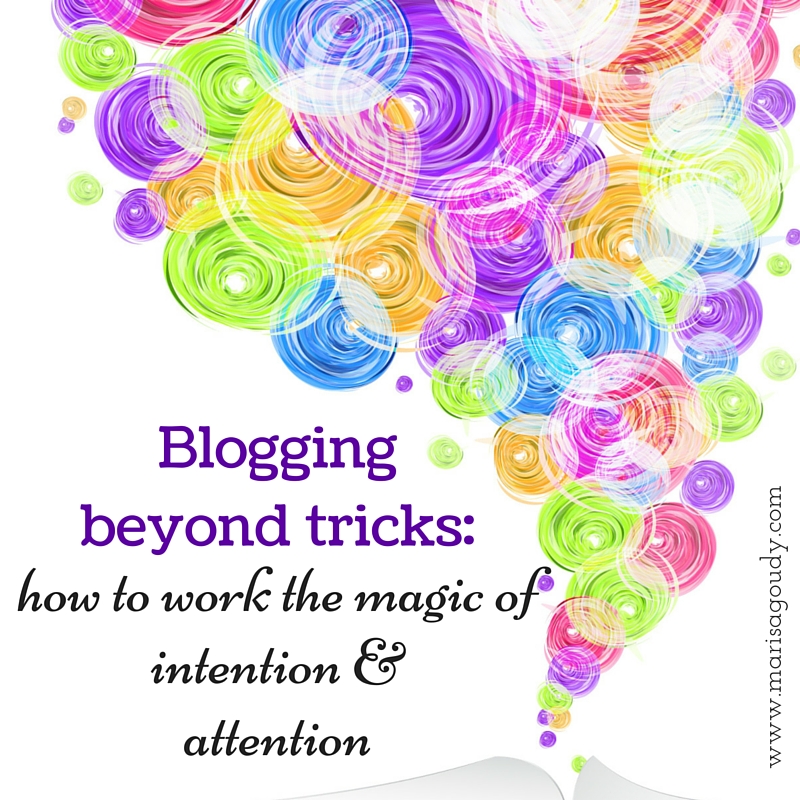 Yes, there are specific strategies that will make your blogging more effective - and will shorten the writing time. You can even shorten the editing process when you bring it to someone like me!
Yes, there are specific strategies that will make your blogging more effective - and will shorten the writing time. You can even shorten the editing process when you bring it to someone like me!
And yes, you might say there are blogging “tricks” that help you create posts that are really special - not because you’re pulling a fast one but because you’re working your own kind of magic.
You don’t need blogging tricks, but a little magic is always helpful
Something you should know about me: I believe in magic.
 Mostly, I believe in magic because I have no interest in living in a "what you see is what you get" world. I believe in the magic of stories, symbols from nature, and the depths of dream.
Mostly, I believe in magic because I have no interest in living in a "what you see is what you get" world. I believe in the magic of stories, symbols from nature, and the depths of dream.
I also believe that magic flows when you focus your intention and attention. That’s exactly how words and sentences flow too.
You don’t need tricks to make your writing practice work for you and your business. You need a strong intention and you need to give your writing the attention it deserves.
[tweetthis]Magic flows when you focus your intention and attention. Same is true for your #writing.[/tweetthis]
Before you write a word: begin with intention
When you sit down to create content for your blog, what motivates you?
- You’re trying to keep up with those “epic content dudes” who tell you that modern business is about publish or perish.
- You’re fulfilling a promise to your coach or some sort of accountability group.
- A general case of the “shoulds.” You’re not even sure why you’re blogging, but you figure you better get started because you’re already so far behind.
- You wish to explore a long percolating idea or a sudden flash of insight. Taking these ideas beyond scribbled notes and Word docs and into the public arena deepens the process and opens new perspectives.
- You’re writing out of love and service, trusting that the people who need to hear your message will offer your words the attention they deserve.
Because this is a post about a writing practice guided by personal intention and attention, there’s no single right answer.
There are, however, a few very wrong answers – if your motivation to write is based purely on obligation or fear.
Your “why” is the source of your writing magic
When you don’t know why you’re writing something - when you’re unclear of your intention - it’s nearly impossible to connect with the reader.
When you don’t connect to your reader, you’ll never achieve the goal of the post or article.
Your goal may be simple: “get more business.” But no one will get past the first few lines of a blog post if it’s clear the writer is only in it for the sale. The reader also won’t get very far if it seems the writer is just publishing because someone told her she “should.”
So why are you really writing?
Call me a romantic. Call me an idealist. Heck, call me a writer! I believe the only writing that ultimately succeeds is composed in a spirit of love and service.
Consider the success of direct mail copywriters and lousy popular novelists. Clearly you can write successfully when inspired by the love of money and in service to the beast of fame. I’m not here to judge those folks. They prove that passion and dedication will get you what you want.
But I think you’re a little bit more like me than you are like the guy with the perfect marketing formula.
You care deeply about your business and what you offer your clients. You love the people who buy from you – and not just because you adore the ka-ching of your PayPal notification tone.
Thing is, you don’t necessarily love writing for your business. Put it another way - you haven’t fallen in love with the writing process yet because you don’t understand the why of your attraction.
[tweetthis]The only #writing that truly connects is composed in a spirit of love and service.[/tweetthis]
Your writing “why” has a name and a face
A lot of brilliant people say you must write for yourself first.
“Close the door. Write with no one looking over your shoulder. Don’t try to figure out what other people want to hear from you; figure out what you have to say. It’s the one and only thing you have to offer.”
Barbara Kingsolver is exactly right.
Hear a “but…” statement coming?
Presumably this great novelist is talking about fiction, not writing a blog post that helps bring in business.
Kingsolver would be spot on if we were still in the heady days of personal blogs when finding your voice was so central and “if you write it, they will come” was still semi-true.
Now, many take selfies to tell personal stories. Creative entrepreneurs and therapists use blogs to further their business, art, and practice in a more systematic, strategic way.
You can tell your personal stories just about anywhere. Your business blog exists to serve the reader. (Your stories are important, but they're the vehicles that carry your message, not your writing's fundamental raison d'etre.)
Your reader is your “why.” To satisfy her needs and curiosity… that must be your intention every time you publish a post.
The blog is the place to engage the reader with stories that illuminate her story. The blog sustains the reader with solutions to problems that keep her up at night.
Ok, your blog is still about you - in a way
There’s one part of blogging that’s about you: determining what sort of content you can comfortably, sustainably create. After all, creating content is a marathon, not a sprint.
This goes back to intention… You’re intentionally building a business around your gifts, your passions, your desire to solve the problems of a community of people you love.
Logically, any writing you do to support this work will feel doable - even if the writing itself still takes a lot of effort.
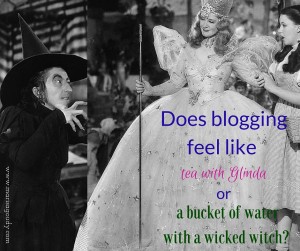 But, if every writing session is torture and you feel like a house fell on your sister rather than you're flying in an orb of fairy dust, there is something wrong.
But, if every writing session is torture and you feel like a house fell on your sister rather than you're flying in an orb of fairy dust, there is something wrong.
You need to figure yourself into the writing process too and make adjustments to your writing routine, topic choice, and delivery style. If you don’t feel like a good witch when you’re writing, change your approach.
When your writing process feels more like a Dark Art rather than a lovely session with Glinda and Dorothy, let’s set up a complimentary 15 minute chat and share a long distance cup of tea so I can help you identify at least one adjustment you can make right away.
Once your intention is clear, you know where to direct your attention
Writing can be an emotional entanglement of sorts. Everyone has a different relationship with their words, but there’s one common factor in every writer-writing relationship -- attention.
An attention-starved writing practice is absolutely nothing but a dusty notebook inscribed with regret.
You love your business, you love the people you have been called to serve.
And so we return to:
You write online content out of a spirit of love and service, trusting that the people who need to hear your message will offer your words the attention they deserve.
When you show your love to your business and your reader-clients, they repay your intentional attention with their own (incredibly valuable) attention.
Blogging = Love. So how do you fall in love with the writing process so you can share the greater love?
Because I want to wave my magic wand and take the pain out of blogging for you, I am tempted to tell you that you can click your heels together with intention and pay simply attention to what the Wizard says.
There’s a great chance that getting clear on your "why" and sitting down to DO the writing is all you need. But that does you a great disservice if you’re someone who feels like she can’t cast a writing spell without some help.
You have other options. You can create video. You can start a podcast. You can create visual experiences for your beloved community.
You can explore the different kinds of writing support that are out there and make a decision based on your skills and resources.
And you and I can talk about your writing-for-business intentions and how they mix - or don’t! - with your reality as an entrepreneur or clinician whose attention is already pulled in so many directions.
Send me a note and we’ll schedule 15 minutes to sip tea and talk about how you can find the magic in your own message.
Why You - and Your Business - Need the Creative Constraints of Blogging
Sovereign Standard, Issue 27  Big-eared and sweet-eyed, the doe is where nature's sense of peace and trust collide with the potential for flight and terror.
Big-eared and sweet-eyed, the doe is where nature's sense of peace and trust collide with the potential for flight and terror.
Earlier this week, my 19-month-old and I shared a sacred, homey moment with the local deer herd. It was a well-earned pause after over two weeks and over 2000 miles of travel.
As I watch, I’m rooted in the moment, but I’m filtering it all through my writer’s lens. Am I distracting myself from being in the moment by taking mental notes and adapting family stories to prove a professional point?
It’s my way of being in the world and I don’t think I could ever stop. In fact, I think this kind of dual awareness is essential to leading a writer’s life.
A blogger's confession: sometimes, I don’t want to write a story you’ll care about
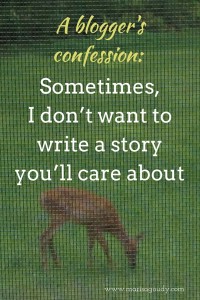 Thoughts of “this would be great in a post” aren't distracting me. It’s the stupid the window screen and the way I have to keep shifting my gaze so I see the deer rather than the crisscross patterns.
Thoughts of “this would be great in a post” aren't distracting me. It’s the stupid the window screen and the way I have to keep shifting my gaze so I see the deer rather than the crisscross patterns.
To deal with my annoyance, I play with the metaphor. As I muse about what divides us from nature and the sheer pleasure of the present moment, I consider the scene from a dozen different angles.
But really, I just want to describe this moment. I want to dwell on how it’s my grandmother’s birthday, and though she’s been gone for over a decade, this feels like her blessing. I want to revel in the way my daughter’s hair looks like rose gold in the dawn light.
Truthfully, I want to forget about you, dear reader. I want to pretend I can't hear your ever-present question: “What’s in this story for me?”
I want to transmit the magic of this moment without concerning myself with how it’ll further your writing practice. I want to present the trust of that wild animal’s eyes and leave it you to run with the story on your own fleet hooves.
Thing is, I would never get around to writing such a sweet little vignette.
The Power - and Necessity - of Creative Constraint
Constraints give us a starting point and some building blocks to work with—a problem to solve, an innovative twist to be revealed, or a person to please. - David Sturt
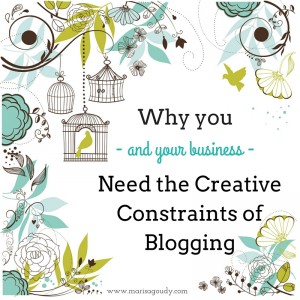 Without constraints, you struggle to find a container or a framework that grounds your creative work. You need a venue, a deadline, and an audience with a set of expectations to get your ideas out into the world on a regular basis.
Without constraints, you struggle to find a container or a framework that grounds your creative work. You need a venue, a deadline, and an audience with a set of expectations to get your ideas out into the world on a regular basis.
My weekly Sovereign Standard posts demand that I focus my “I could write about anything!” energy and actually publish something worthwhile each week.
I think if you’re given a clean, fresh palette, and you do whatever you want, it’s almost too much freedom, at least for me. - Damien Correll in Belle Beth Cooper’s article about how artists and entrepreneurs use limitation and restriction to create great things.
The business blog is an inherently restrictive platform. It has limits - thank goodness!
The delectable, reliable constraints of your biz blog
A business blog post needs certain elements to be successful. These characteristics are what differentiates it from a personal or “hobby” blog where you can write whatever you want. (Within reason… you still have to produce interesting, well-written content on a non-commercial blog.)
Each professional post must:
- Have a goal. You want your reader to do something at the end of each post based on your Call to Action (CTA). The whole post is leading your ideal client to take the next step and engage more deeply with your brand. Ask them to sign up for your newsletter, listen to the podcast you just appeared on, or call to set up a free introductory consult.
- Make the reader the hero. Even as you tell captivating, elevating stories - many of which may be inspired by your own experience - you need to consider how the reader is experiencing the narrative. Can she relate to what you’re talking about and understand how the story is a guide of what to do or what not to do?
- Know the value of attention. The job of each sentence is to get the reader to reach the next sentence. Don’t squander your reader’s precious time on extraneous details that don’t either draw her into your world or give her something useful to do or consider.
- Appeal to the skimming reader. Your blog is not a book, a term paper or your thesis, or a professional document. Don’t sacrifice your voice to imitate the style of UpWorthy or even Copyblogger, but remember that people are reading your work on an iPhone, not from a leather bound volume. Honor your reader’s splintered modern attention spans or prepare to lose her to the next shiny digital object.
What NOT to write about on your biz blog
You can’t abandon a regularly scheduled post that’s full of practical information about maintaining a strong marriage in order to simply rave about your romantic getaway.
You can’t skip the tips about managing your children’s difficult behavior just to describe how smoothly the first day of school went at your house.
You can’t rave about how delicious the gluten free blueberry cream cheese coffee cake you just made without including the recipe.
You wouldn’t post content like this on your business blog because it sounds like self-centered bragging, of course. Without the “news they can use” or the moral to the story, you’re likely wasting your reader's time.
Think about “what not to write” from the positive side: you wouldn’t want to miss the opportunity to offer the helpful content your readers love just because your muse wants to linger in the afterglow of a life well lived.
Get a room. Better yet, get a guest post spot.
Personal experiences provide excellent material for your professional blog. Just be sure you do it with respect and set your TMI filters to “very, very picky.”
But, when you find your story cup overfloweth and you want to explore ideas that don’t connect directly with your business, remember that there’s a whole other world of blogs out there that don’t demand that your writing leads to an obvious, income-boosting call to action.
People with passions for stories, readers who seek out beauty and inspiration… They’re out there, and they’d love to have you write for them.
If and when you do land a guest spot on a blog that focuses on travel, parenting, or cute fuzzy puppies, do remember to maintain your own Sovereign Standard and honor the advice you’ve picked up here!
Other lessons from the deer and the little girl who scared her away
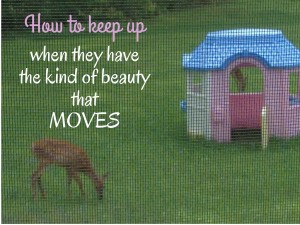 I’m honored that my friend Vanessa of Nessa Knows Best has offered me a guest blogging position on her site for savvy moms.
I’m honored that my friend Vanessa of Nessa Knows Best has offered me a guest blogging position on her site for savvy moms.
There were countless ways I could have explored the metaphor of the window screen, the doe, and the toddler… which did I choose? Come read How to keep up when they’ve got the kind of beauty that moves.
